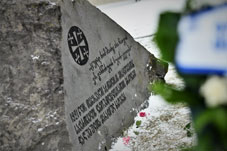100 years since Soviet occupation of Georgia
By Veronika Malinboym
Friday, February 26


In his address commemorating the 100th anniversary of the Soviet occupation, newly appointed PM Irakli Garibashvili said that February 25 is one of the most tragic days in the history of Georgia, and the date reminds all of the country’s citizens of the heroism of their ancestors, who died fighting for their homeland. He added that despite Russia’s temporary occupation of the Georgian territories, the country is still moving forward towards a stronger economy and democracy, and, by achieving union within, Georgia will be able to secure more victories in the future.
Georgian Minister of Foreign Affairs David Zalkaliani tweeted “Exactly a century has passed since the brutal invasion of Soviet Russia’s Red Army to Georgia, and the fall of the Democratic Republic of Georgia. Today we honor the memory of the heroes, who stood up against the Soviet Occupation in 1921 and sacrificed their lives in order for us to enjoy Independence today!”
In his address Speaker of the Georgian Parliament and member of the ruling Georgian Dream party, Archil Talakvadze reminded that although Georgia is now a sovereign country, some of its territories remain occupied, and added that he is sure that “we will complete our ancestor’s fight for freedom.”
Members of the Georgian opposition bloc, who also visited the cemetery to commemorate the victims of the Soviet occupation addressed the ongoing crisis and a “symbolic detention of one of the opposition leaders”, just a day before the 100th anniversary, a move that, according to the opposition, jeopardized Georgian Euro-Atlantic aspirations.
On February 25, 1921, Red Army entered Tbilisi and overthrew the government which was appointed by free general elections. The day of Soviet occupation was first marked in 2010, following the Parliament’s unanimous vote in favor of a yearly commemoration of the victims of repressions of the occupying regime on February 25.
